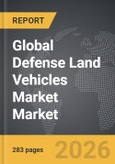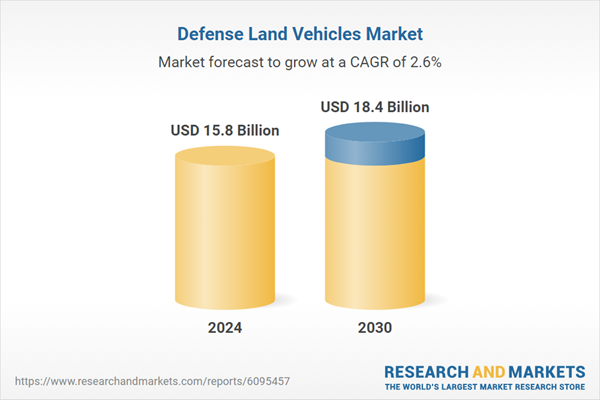Global Defense Land Vehicles Market - Key Trends & Drivers Summarized
What Is Fueling Demand for Modernized Defense Land Vehicles Globally?
Defense land vehicles remain at the core of ground combat operations, rapid troop deployment, border patrols, and supply chain support. Their strategic importance is expanding as military doctrines evolve to address hybrid warfare, urban combat, and asymmetric threats. Armies are actively replacing outdated fleets with next-generation platforms that offer improved mobility, firepower, survivability, and communication capabilities. From heavy main battle tanks to nimble light tactical vehicles, defense forces are prioritizing versatility and mission adaptability.The rise in peacekeeping operations, border surveillance missions, and domestic response scenarios has further increased the demand for armored transport and multi-role vehicles. Governments are not only procuring modern vehicles but also investing in the retrofitting and up-armoring of existing fleets to meet evolving threat profiles. This dual-track strategy of fleet renewal and performance upgrades underscores the central role that land vehicles continue to play in ground warfare and homeland security operations.
How Are Defense Land Vehicle Platforms Evolving Technologically?
Modern land vehicles are being transformed by digital integration, advanced armoring, and modular design principles. Vehicle architecture is increasingly modular, allowing for quick configuration changes depending on mission needs - be it troop transport, command and control, or fire support. Electric and hybrid propulsion technologies are being explored to improve operational silence and fuel efficiency, particularly for reconnaissance and special operations units.Survivability features are being enhanced through active protection systems, electronic countermeasures, and blast-resistant hull structures. At the same time, vehicles are being equipped with advanced sensors, GPS navigation, battlefield communication networks, and integrated C4ISR systems to function as mobile command units. Automation is also entering the domain, with remote weapon stations and optionally manned or autonomous ground vehicle prototypes under development for future battlefield roles.
Which Regions and Forces Are Leading in Vehicle Procurement and Development?
Several countries are leading the charge in developing, procuring, and exporting advanced land combat vehicles. The U.S. and European powers are actively upgrading their legacy fleets and participating in collaborative platform development programs. In Asia, countries like China, India, and South Korea are advancing indigenous land vehicle programs both for domestic use and export potential. Many Middle Eastern and African countries are importing a wide range of land systems to support internal defense and counterterrorism operations.Collaborative development models and offset agreements are playing a key role in enabling technology transfer and local assembly. Partnerships between global OEMs and national defense industries are resulting in co-developed platforms tailored to local terrain and mission requirements. This growing trend toward defense industrial self-reliance is reshaping the competitive landscape of the global defense land vehicle market.
What Factors Are Driving Growth in the Defense Land Vehicles Market?
Expanding defense budgets and modernization initiatives are propelling large-scale procurement of armored vehicles, tactical transporters, and mobile combat platforms. The nature of contemporary conflict, which often unfolds in unpredictable environments and involves both conventional and unconventional threats, is amplifying demand for vehicles that combine agility with superior protection. The requirement for force projection, rapid mobility, and integrated battlefield connectivity is also reshaping vehicle specifications.Domestic manufacturing mandates and localization policies are encouraging countries to invest in homegrown vehicle platforms and upgrade programs. Technological innovations - ranging from battlefield digitization to autonomous navigation - are creating new design possibilities and expanding vehicle roles. Defense land vehicles are now expected not just to transport troops or carry weapons, but to operate as interconnected assets in network-centric warfare. These dynamics are anchoring the land vehicle segment as a high-priority investment area for defense ministries worldwide.
Report Scope
The report analyzes the Defense Land Vehicles market, presented in terms of market value (US$). The analysis covers the key segments and geographic regions outlined below:- Segments: Vehicle Type (Infantry Fighting Vehicles, Armored Personnel Carriers, Main Battle Tanks); Application (Combat Operations Application, Logistics & Support Application, Reconnaissance & Surveillance Application, Other Applications).
- Geographic Regions/Countries: World; United States; Canada; Japan; China; Europe (France; Germany; Italy; United Kingdom; Spain; Russia; and Rest of Europe); Asia-Pacific (Australia; India; South Korea; and Rest of Asia-Pacific); Latin America (Argentina; Brazil; Mexico; and Rest of Latin America); Middle East (Iran; Israel; Saudi Arabia; United Arab Emirates; and Rest of Middle East); and Africa.
Key Insights:
- Market Growth: Understand the significant growth trajectory of the Infantry Fighting Vehicles segment, which is expected to reach US$11.5 Billion by 2030 with a CAGR of a 2.4%. The Armored Personnel Carriers segment is also set to grow at 3.1% CAGR over the analysis period.
- Regional Analysis: Gain insights into the U.S. market, valued at $4.3 Billion in 2024, and China, forecasted to grow at an impressive 4.9% CAGR to reach $3.5 Billion by 2030. Discover growth trends in other key regions, including Japan, Canada, Germany, and the Asia-Pacific.
Why You Should Buy This Report:
- Detailed Market Analysis: Access a thorough analysis of the Global Defense Land Vehicles Market, covering all major geographic regions and market segments.
- Competitive Insights: Get an overview of the competitive landscape, including the market presence of major players across different geographies.
- Future Trends and Drivers: Understand the key trends and drivers shaping the future of the Global Defense Land Vehicles Market.
- Actionable Insights: Benefit from actionable insights that can help you identify new revenue opportunities and make strategic business decisions.
Key Questions Answered:
- How is the Global Defense Land Vehicles Market expected to evolve by 2030?
- What are the main drivers and restraints affecting the market?
- Which market segments will grow the most over the forecast period?
- How will market shares for different regions and segments change by 2030?
- Who are the leading players in the market, and what are their prospects?
Report Features:
- Comprehensive Market Data: Independent analysis of annual sales and market forecasts in US$ Million from 2024 to 2030.
- In-Depth Regional Analysis: Detailed insights into key markets, including the U.S., China, Japan, Canada, Europe, Asia-Pacific, Latin America, Middle East, and Africa.
- Company Profiles: Coverage of players such as AAR Corp., Airbus SE, BAE Systems plc, Boeing Defense, Space & Security, Elbit Systems Ltd. and more.
- Complimentary Updates: Receive free report updates for one year to keep you informed of the latest market developments.
Some of the 43 companies featured in this Defense Land Vehicles market report include:
- AM General LLC
- Ashok Leyland Ltd.
- BAE Systems plc
- Chaiseri Metal and Rubber Co., Ltd.
- China North Industries Group Corp. (Norinco)
- Elbit Systems Ltd.
- FNSS Defense Systems
- General Dynamics Corporation
- Hanwha Defense
- Hyundai Rotem Company
- Iveco Defence Vehicles
- Katmerciler A.S.
- Krauss-Maffei Wegmann GmbH & Co. KG
- Lockheed Martin Corporation
- Nexter Systems
- Oshkosh Defense LLC
- Paramount Group
- Rheinmetall AG
- ST Engineering Ltd.
- Tata Motors Limited
This edition integrates the latest global trade and economic shifts into comprehensive market analysis. Key updates include:
- Tariff and Trade Impact: Insights into global tariff negotiations across 180+ countries, with analysis of supply chain turbulence, sourcing disruptions, and geographic realignment. Special focus on 2025 as a pivotal year for trade tensions, including updated perspectives on the Trump-era tariffs.
- Adjusted Forecasts and Analytics: Revised global and regional market forecasts through 2030, incorporating tariff effects, economic uncertainty, and structural changes in globalization. Includes historical analysis from 2015 to 2023.
- Strategic Market Dynamics: Evaluation of revised market prospects, regional outlooks, and key economic indicators such as population and urbanization trends.
- Innovation & Technology Trends: Latest developments in product and process innovation, emerging technologies, and key industry drivers shaping the competitive landscape.
- Competitive Intelligence: Updated global market share estimates for 2025, competitive positioning of major players (Strong/Active/Niche/Trivial), and refined focus on leading global brands and core players.
- Expert Insight & Commentary: Strategic analysis from economists, trade experts, and domain specialists to contextualize market shifts and identify emerging opportunities.
Table of Contents
Companies Mentioned (Partial List)
A selection of companies mentioned in this report includes, but is not limited to:
- AM General LLC
- Ashok Leyland Ltd.
- BAE Systems plc
- Chaiseri Metal and Rubber Co., Ltd.
- China North Industries Group Corp. (Norinco)
- Elbit Systems Ltd.
- FNSS Defense Systems
- General Dynamics Corporation
- Hanwha Defense
- Hyundai Rotem Company
- Iveco Defence Vehicles
- Katmerciler A.S.
- Krauss-Maffei Wegmann GmbH & Co. KG
- Lockheed Martin Corporation
- Nexter Systems
- Oshkosh Defense LLC
- Paramount Group
- Rheinmetall AG
- ST Engineering Ltd.
- Tata Motors Limited
Table Information
| Report Attribute | Details |
|---|---|
| No. of Pages | 283 |
| Published | February 2026 |
| Forecast Period | 2024 - 2030 |
| Estimated Market Value ( USD | $ 15.8 Billion |
| Forecasted Market Value ( USD | $ 18.4 Billion |
| Compound Annual Growth Rate | 2.6% |
| Regions Covered | Global |









